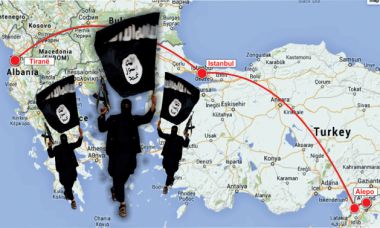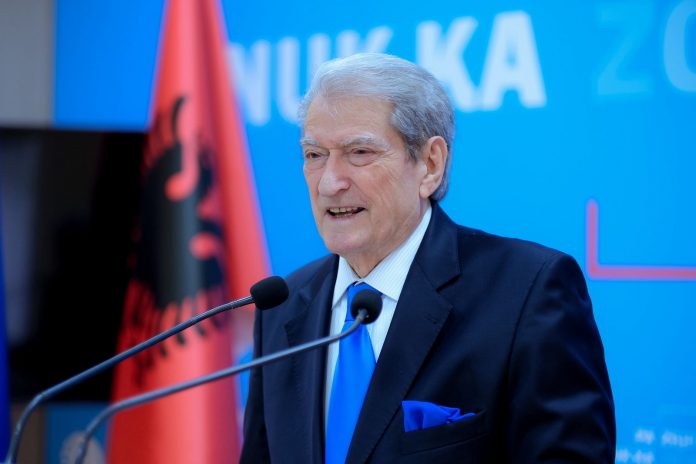ISIS Killed Albanian Jihadist Who Wanted Out

“Bris, are you there? I can’t talk, but Ervin is not with us anymore. He is gone…he is dead. I am dead too!
This Viber message sent from a camp in Syria arrived on April 4th in cell phone of Brisilda Hasanaj.
The 20-year-old, who works as a migrant in Greece, had hard time coming to terms with the news that her brother had been killed.
“I was the first [from the family] to hear from my sister in-law that my brother had died in Syria,” Brisilda says. “Now she is alone out there with her two daughters,” she added.
Ervin Hasanaj, identified by Tirana authorities as one of 90 Albanian jihadists who have traveled to Syria to join the conflict, was killed on April 1st in circumstances that have yet to be clarified.
The 24-year-old left for Syria three years ago and was there with his wife, Nexhmije, and two daughters and was believed to be fighting for Islamic State forces in Iraq and Sham.
Hasanaj is the one of 13 Albanian citizens who have died in Syria, fighting for radical Islamic groups like ISIS. Unlike the others, however, it is believed that he was killed by the group he was fighting for, after trying to desert.
“We suspect he refused to fight and that’s why he was executed,” a source with knowledge of Syrian jihadi groups told BIRN.
Such a claim is difficult to verify, and Hasanaj’s family remain unclear about the circumstances of his death.
Hasanaj’s mother is also struggling to come to terms with the death of her son.
Sitting in black in a poorly furnished rented room in the town of Kamza, just outside the capital, Tirana, Xhyhere Hasanaj says that all she knows is the little information she has received from her daughter-in-law over the phone.
“She told me that they killed him when he was returning to the camp where they were staying,” she says.
“They sent her the body to see it and then buried it without her being present,” Xhyhere adds, with tears streaming.
Jihadist fighters who travel to Syria to join radical militant Islamic group have become a matter of concern for the Albanian authorities.
Last year, the Interior Minister expanded its anti-terror department and intensified exchanges of information with Europol and other Western governments concerning the threat.
Asked about Hasanaj’s death at a press conference, the Interior Minister, Saimir Tahiri, declared that the authorities were working in cooperation with partner intelligence services to shed light on what had happened.
“We are in continual contact with partner agencies and with the family of these people,” Tahiri said.
However, contradicting the minister’s claims, Xhyhere Hasanaj says that no one has knocked on her door since her son’s death.
“Nobody from the police or the state has come here to ask about Ervin,” Xhyhere said. “You are the first come here,” she told this reporter.
Became devout at an early age:
He was 21, the father of a young daughter and was awaiting the birth of another child.Hasanaj left Albania for Syria on January 16, 2013, together with Diamant Rasha, another Albanian jihadist who was killed in December 2013.
Official documents obtained by BIRN show that his wife joined him in Syria with her two children immediately after she gave birth to their second daughter. His daughters, now two and four, are stranded in camp run by ISIS in Syria.
His mother, Xhyhere, says their lives were always difficult. Originally from the small town of Mamurras she moved to Tirana 15 years ago with her small children after her husband died.
Unemployed and with two children to feed, she found help from an Islamic relief foundation, which provided her with food and a small pension. Xhyhere says that she while remained indifferent to religion, her son turned to Islam at an early age.
“He was only 12 when he started to go to the mosque every day,” she recalled. “In the beginning I used to lock him in the house but later I could not stop him,” Xhyhere added.
Although Xhyhere is a Muslim, she refers to the beliefs of her son, curiously, as the “other faith.”
She expresses the same regret about her daughter-in-law, who Xhyhere says was covered from head to toe in a hijab from an early age.
“They met through a matchmaker and were married really young,” Xhyhere said. “The family members of my daughter-in-law are all practicing Muslims,” she added.
Xhyhere describes her son as a quiet and introverted boy who devoted his life to his faith. However, long after he traveled to Syria in 2013, he would not tell her where he had gone.
“When he used to call, he would tell me he was in Europe,” she recalls. “My daughter-in-law would repeat the same line, until people started talking,” Xhyhere added.
When she learned that her son was actually in Syria, Xhyhere could not believe it. “He was deceived by people now in prison,” she said.
Xhyhere was referring to a network of recruiters who were arrested in 2014, accused of funneling fighters from Albania to Islamic groups in Syria. The network was headed by two imams, Genc Balla and Bujar Hysa, both now under arrest.
According to documents from the prosecutor’s office that BIRN has obtained, Hysa recruited Hasanaj to fight in Syria.
The document contains an intercepted phone call between Hysa and Hasanaj’s brother-in-law, Altin Beka.
The authorities intercepted the conversation in November 2013, when Beka was sending his sister and her two daughters to join Hasanaj in Syria.
“I’ve made it to Hatay but there is no one there waiting for us,” Beka tells Hysa, referring to the province in southern Turkey bordering Syria.
Hysa replies that they should go to a hotel in the town of Rejhanli where a contact will meet them. The conversation confirms that Hasanaj’s wife crossed into Syria with the help of Hysa’s contacts.
Growing disenchantment with jihadism:
As a member of the al-Nusra Front, Hasanaj was allegedly kidnapped by ISIS fighters last January.Hasanaj’s career as a fighter in Syria can be divided into two chapters. In the first, he fought with the al-Nusra Front and in the second with ISIS.
The news of his kidnapping worried his brother-in-law Beka and Imam Hysa. An intercepted phone call shows that Hysa was notified of Hasanaj’s kidnapping and questioning whether ISIS was behind it.
“Maybe it’s the Free Syrian Army because the State [ISIS] has an agreement with Jabhat al-Nusra,” Hysa says during the phone call.
It is unclear how the kidnapping affected Hasanaj’s feelings for the jihadist group, but his mother says that a month before he was killed he started telling her that he would be returning home.
“A month before his death he started saying that would soon be home,” Xhyhere said. “He was disappointed and did not want to fight any longer,” she added.
Still mourning the death of her son, Xhyhere now hopes her daughter-in-law and two granddaughters will be able to return home.
Since Hasanaj’s death, his wife Nexhmije has joined the legion of widows with children stranded in ISIS camps in Syria. Since the start of the conflict, six of the 13 Albanian women who joined their husbands in Syria have become widows.
Despite efforts by family members, none of these women left in Syria with their children has been able to return. Xhyhere Hasanaj says the Albanian state has offered no help in this regard.
“My son is gone but I want my granddaughters and my daughter-in-law back home as soon as possible,” she said. “It’s the only hope I have left,” she concluded.
BIRN
 KOHA JONË SONDAZH
KOHA JONË SONDAZH






















